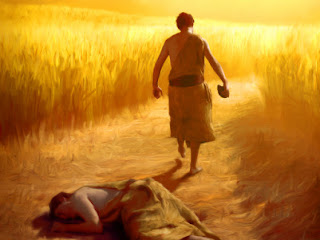--------------------------
"This kind can only come out through prayer" [Mk 9:29].
Jesus is telling the disciples something very important here. First, God's power remains God's power; it doesn't become ours. When His power moves through us to accomplish His will, we don't possess it.
 Perhaps the disciples had forgotten this, and assumed God's healing power, the power He exercised through them, had become theirs. Jesus is reminding His disciples that they must remain in constant communion with God, something which can be done only through prayer.
Perhaps the disciples had forgotten this, and assumed God's healing power, the power He exercised through them, had become theirs. Jesus is reminding His disciples that they must remain in constant communion with God, something which can be done only through prayer.When St. Paul instructs us to "Pray without ceasing" [1 Thes 5:17], he's speaking of holiness, the result of that constant connection between the soul and God, a connection that keeps us always mindful of God's will for us.
But when you consider prayer from a strictly human perspective, it's really quite strange, isn't it? In prayer we communicate with Someone we can neither see nor hear. Physical sight and hearing are really not involved. And so prayer, even the prayer of weakness, the prayer of the unbeliever who turns to God in desperation - even that prayer demands at least a glimmer of faith. Indeed, it's in that turning to God that this faith is manifested.
In the Letter to the Hebrews we're told that, "Faith is the realization of what is hoped for and evidence of things not seen" [Heb 11:1]. Yes, hope and faith, even in their weakest form, are necessary ingredients of prayer.
Listen again to that brief dialog between Jesus and the desperate father in today's Gospel passage [Mk 9:22-24]. The father pleads with Jesus:
"But if you can do anything, have compassion on us and help us."
Jesus said to him, "'If you can!' Everything is possible to one who has faith."
Then the boy's father cried out, "I do believe, help my unbelief!"Once again, the faith of the people, the faith of those who come to Jesus in pain and suffering and dire need, puts the disciples to shame.
I don't know about you, but I feel a deep connection with this unnamed father. He pleads with Jesus to "help us" - not help my son, not help him, but help us. His love for his son is so great that his son's pain, his son's suffering, have become his pain, his suffering. With this he's already taken a necessary first step on the path to true discipleship: he accepts that to be truly human, to be in God's image and likeness, he must love.
This prayer of ours, then, this personal encounter with Jesus Christ, must lead us to serve others in Christ's name. Our service to those in need must always be the outgrowth of our prayer. Otherwise our prayers are only selfish ramblings, really no prayer at all.
The father then takes a second step to discipleship when he has an honest encounter with his own faith. Unlike the disciples - "that faithless generation" [Mk 9:19] - who can't understand why they are unable to exercise God's healing power, the father also knows that his faith, although real, is still very weak. And driven by this self-awareness, he utters his now-famous words: that statement of fact followed immediately by his contradictory plea:
"I do believe, help my unbelief!" [Mk 9:24]
 On hearing such words, the faithless will just cast them aside as an unresolved paradox. But to those of us struggling through the times of darkness that enter every life, his words make perfect sense. Faith and doubt, belief and unbelief often exist side-by-side in the same heart, especially when that heart is broken or filled with fear.
On hearing such words, the faithless will just cast them aside as an unresolved paradox. But to those of us struggling through the times of darkness that enter every life, his words make perfect sense. Faith and doubt, belief and unbelief often exist side-by-side in the same heart, especially when that heart is broken or filled with fear.Do you see what else Jesus is telling this distraught father, what He is telling us?
There are no limits to the power of prayer. "Everything is possible..." [Mk 9:23] Jesus tell us. All that is necessary is faith. In other words, the possibilities are endless. And it all comes through the Gospel, the Good News, the story of faith made real for us.
Jesus is telling us that our relationship with God can deepen only through a strengthening of our faith; and faith can deepen only through prayer. Otherwise, like the disciples that day, we can become self-absorbed, something that will ultimately enslave us.
We are slaves, you know -- slaves to our sinfulness. That's why Christ ransoms us. Can we accept this? Can we let the Spirit pray in us so we thirst for the chalice from which Jesus drinks?
Can we accept that, as Jesus' disciples, we are baptized in the baptism of Christ's Cross?
Is my prayer the gift of myself with Christ on the Cross?
I think those are enough questions for us to ponder today.
God's peace.





